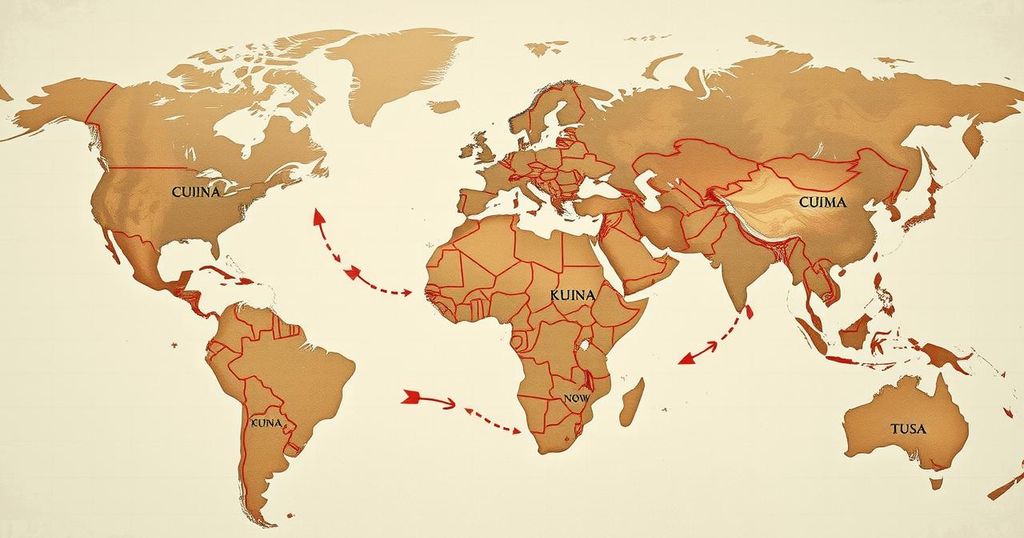Evaluating Trump’s Foreign Policy: High Hopes and Limited Results

As President Trump nears the end of his first 100 days in his second term, his foreign policy initiatives have shown little success. The conflict in Ukraine remains unresolved, while Israel’s aggression towards Palestinians is unchecked. Trade tensions with China persist without resolution. Trump’s approach has often alienated allies and neglected complex geopolitical realities, raising questions about the effectiveness of his diplomatic strategies.
As President Donald Trump approaches the symbolic end of his first 100 days in his second term, it is apparent that his impulsive foreign policy has achieved minimal progress in resolving global disputes or enhancing international trade agreements beneficial to the United States. The ongoing conflict in Ukraine continues unabated, with Russia increasing its bombing campaigns despite Trump’s initial claims that he could terminate the war swiftly upon taking office. In the Middle East, Israel’s military aggression towards Palestinians persists, disregarding a fragile ceasefire with Hamas. Moreover, China remains steadfast in its trade conflict with the United States, providing no evidence of willingness to compromise, which raises doubts about Trump’s foreign policy efficacy and highlights a tendency towards overconfidence and oversimplification in complex issues.
In reference to the situation in Ukraine, Trump had initially planned to utilize his established rapport with Russian President Vladimir Putin to swiftly bring about peace through a ceasefire and territorial concessions to Russia, while aiming to exert pressure on Kyiv by reducing military aid. However, Putin rejected the ceasefire proposal outright, despite the terms of the deal appearing favorable; meanwhile, the Ukrainian stance on territorial ceding, including Crimea, remains solid. Trump’s approach notably underestimated the complexities involved and the steadfastness of the parties regarding the conflict.
Furthermore, Trump’s approach to foreign policy has alienated NATO allies and supporters of Ukraine, who perceive his offers to Russia as incentives for aggression. The exclusion of Ukraine from vital discussions, such as the US-Russia talks held in Saudi Arabia, has deepened concerns among American allies. Criticism of Trump’s strategy, particularly regarding its implications for territorial control by Russia, has grown as his approach seems to undermine collaborative international efforts and encourage further acts of aggression.
Regarding the Gaza conflict, Trump aimed to reinforce the momentum of the Abraham Accords, which normalized relations between Israel and several Arab nations. While these accords marked a strategic change, they overlooked Palestinian aspirations for statehood. Trump’s actions, which included relocating the US Embassy to Jerusalem and recognizing Israeli sovereignty over contested territories, have been seen as exacerbating the divide. His calls for aggressive military action have further incentivized Israel to pursue contentious practices that have resulted in significant civilian casualties.
With regard to his controversial remark about relocating Gazans, Trump later characterized it merely as a recommendation, reflecting a transactional view toward regional complexities. This approach has not only aggravated tensions in the Middle East but has also diminished the United States’ standing as an impartial mediator in international conflicts.
Trump’s “America First” policy includes tariffs designed to address trade deficits and bolster domestic industries. However, critics assert these measures have disrupted global supply chains without yielding substantial economic progress. The trade war with China, marked by punitive tariffs, has led to higher costs for US consumers and has initiated significant retaliatory measures from China. While symbolic tariff rates have caused disruptions, the broader economic impact appears unfavorable for both nations.
As a direct consequence, American consumers are experiencing increased prices, coupled with declining share values, leading to domestic economic concern. In response to this backlash, Trump has offered to retract tariffs on essential electronics, which may not sufficiently alleviate the economic strains resulting from his trade policies. Notably, China has adapted by reducing its reliance on the American market and diversifying its trade partnerships, positioning itself favorably in the face of the trade conflict.
Furthermore, China has actively sought to expand its trade networks and establish new markets as seen within initiatives like the Belt and Road Initiative. The reallocation of Chinese companies’ manufacturing to countries like Vietnam to circumvent tariffs illustrates a strategic economic adaptation. Conversely, the United States grapples with supply chain challenges and increased production costs without a coherent strategy in place to remedy these complications, casting doubt on the effectiveness of Trump’s trade policies in reshaping global economic dynamics.
Overall, Trump’s foreign policy and trade strategies result in a pattern characterized by ambitious promises but limited outcomes. His negotiational approach, often marked by impulsive and oversimplified resolutions, has resulted in alienating allies, intensifying conflicts, and disrupting economic stability. The complexities seen in Ukraine, Gaza, and the ongoing trade struggle with China suggest a prioritization of immediate gains over long-term solutions, questioning the viability and coherence of his administration’s approach to international relations.
In conclusion, President Trump’s foreign policy and trade strategies reveal a series of bold pledges that have resulted in insufficient outcomes. His approach, characterized by oversimplification and transactional dealings, has alienated key allies and intensified ongoing conflicts. The situations in Ukraine and Gaza, along with the escalating trade war with China, exemplify a focus on short-term results rather than sustainable solutions, which raises significant concerns regarding the effectiveness of Trump’s leadership in global affairs.
Original Source: risingnepaldaily.com






